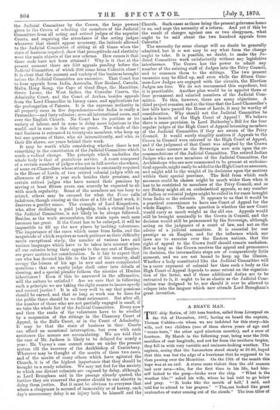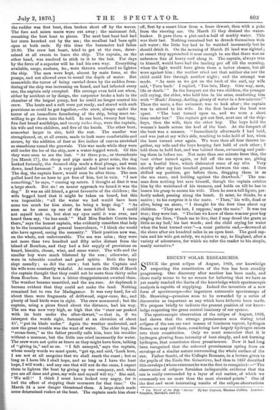A BRAVE MAN.
THE ship Serica, of 560 tons burden, sailed from Liverpool on
the 8th of December, 1867, having on board the captain, Thomas Cubbin—to whom we are indebted for this story—his wife, and two children (one of them eleven years of age and "ocean-born," the other aged nineteen months), and a crew of fourteen. By March in the following year, being near the 50th meridian of east longitude, and not far from the southern tropics, they fell in with very variable and ominous-looking weather. The captain, seeing that the barometers stood steady at 29.80, hoped that this was but the edge of a hurricane that he supposed to be then passing over the Mauritius. On the 13th of the month this hope was at an end. A storm more violent than the old seaman had ever seen—who, for the first time in his life, had him- self lashed to the poop—broke over the ship. "What is the weather like?" asked his wife, whom he had told to go below and pray. "'It looks like the mouth of hell,' I said, and told her to attend to her prayers." The.sea looked like great avalanches of water coming out of the clouds." The iron tiller of
the redder was first bent, then broken short off by the waves. The fore and mizen masts were cut away ; the mainmast fell, smashing the best boat to pieces. The next best boat had bad her stern knocked out by the sea ; the smallest bad been split open at both ends. By this time the barometer had fallen 28.80. The crew lost heart, tried to get at the rum, deter- mined at all events to leave the ship. The captain, on the other hand, was resolved to stick to it to the last. For days by the force of a superior will he had his own way. Everything available, cargo, anchors, &c., were thrown overboard to lighten the ship. The men were kept, almost by main force, at the pumps, and not allowed even to sound the depth of water. But meanwhile the terror of being carried down by the sudden foun- dering of the ship was increasing on board, and had infected every one, the captain only excepted. His courage even held out when, either by accident or by design, the carpenter broke a hole in the chamber of the largest pump, but he could no longer control his crew. The boats and a raft were got ready, and stored with such provisions as could be got together,—the crew, always under the terror of an immediate foundering of the ship, being most un- willing to go down into the hold. In one boat, twenty feet long, five feet broad amidships, and twenty inches deep, were the captain, his wife and two children, and five of the hands. The other boat, somewhat larger in size, held the rest. The smaller was strengthened, or, at all events, made to look more comfortable and secure, by. the addition of four or five inches of canvas stretched as stanchions round the gunwale. This was made while they were still under the lee of the ship, now a water-logged wreck. Of this they were soon to see the last. "At three p.m., or thereabouts [on March 17], the sheep and pigs made a great noise, the dog barked furiously, the doomed ship made a final plunge, and went down, head foremost." A very painful deed had now to be done. The dog, the captain knew, would soon be after them. The men pulled hard for an hour to get free of him, but in vain. "I saw something," he says, "coming up astern. I thought at first it was a large shark. But no ! on nearer approach we found it was the dog." It was an old friend, a great favourite of the children ; the wife begged hard that it might be taken on board, but this was impossible ; "all the water we had would have been none too much for him alone, he being a large dog." "As soon as he came up one of the men killed him. I could not myself look on, but shut my eyes until it was over, and heard them say, he has sunk.'" Had Miss Burdett Coutts been there," says the honest captain, who evidently considers that lady to be the incarnation of general benevolence, "I think she would also have agreed, seeing the necessity." Their position now was, on the whole, not unfavourable. The sea was calm ; they were not more than two hundred and fifty miles distant from the island of Bourbon, and they had a fair supply of provisions on board, biscuits, cheese, wine, and some water. The wife and the smaller boy were much blistered by the sun ; otherwise, all were in tolerable comfort and good spirits. Both the boys slept soundly ; so did the crew ; but both the Captain and his wife were constantly wakeful. At sunset on the 20th of March the captain thought that they could not be more than thirty miles from Bourbon. But here a bitter disappointment awaited them. The weather became unsettled, and the sea rose. At daybreak it became evident that they could not make the land. Nothing remained but to run for Madagascar. It was very hard, for all about them were fragments of driftwood, sugar-cane, &c., and plenty of land birds were in sight. The crew murmured ; but the captain, using a pious fraud about the distance, had his way. The sea was now very high, so high that the "steer oar peaked with its butt under the after-thwart," — that is, if we interpret the words right, fastened at an elevation of about 450, "put its blade under." Again the weather moderated, and now the great trouble was the want of water. The elder boy, the "ocean-born," as the father proudly calls him, bore his troubles without a murmur, but the little one cried incessantly for water. The crew were not quite as brave as they might have been, talking of "giving in," and so on. "I felt annoyed," says the captain, whose manly words we must quote, "got up, and said, 'Look here, I am not at all sanguine that we shall reach the coast ; but as long as I have life I shall hope, and as long as I have the least hope, I will work ; and any one that will not do the same, I expect them to lighten the boat by giving up our company, and, when you are all done and gone, my wife and myself will try.' She said,
'We will I think I must have looked very angry, for it had the effect of stopping their murmurs for that time." On March 24 a new danger threatened them. A large shark made some determined rushes at the boat. The captain made him sheer •
off, Irst by a smart blow from a loose thwart, then with a poke from the steering oar. On March 25 they drained the water- beaker. It gave them a pint-and-a-half of muddy water. ,!\l'his was their last. Nothing remained but to drench themselves thth salt water ; the little boy had to be watched incessantly lest he should drink it. On the morning of March 26 land was sighted ; at sunset they approached it near enough to see that there was an unbroken line of heavy surf along it. The captain, always true to himself, would have had the landing put off till the morning, when the light would have given them a better chance. , but all were against him ; the mother cried out that neither she nor the child could live through another night ; and the attempt was made. "As soon as we got on the back of the surf, my wife said, 'Turn back.' I replied, Too late, Mary. Give way, men, life or death.' " In the forepart sat the two children, the younger still crying, the elder, who held him in his arms, comforting him with "Hush! Jimmy, darling, plenty of water in a few minutes!" These the mate, a fine swimmer, was to look after ; the captain was to attend to his wife. In the first breaker the boat was upset. "The boat turned upon us, and we were a short time under her." The captain got out first, next one of the ship- boys, then the wife, then the other boy. The boys held the woman's hands across the keel of the boat. At the forepart of the boat was a seaman. "Immediately afterwards I had hold, and was just at my wife's side, reaching to take hold of her, when the boat turned over again. We were then all four thrown to- gether, my wife and the boys keeping fast hold of each other ; I told them to hold fast, and was behind them, swimming and push- ing them in before me. Not more than one minute from this, the boat either turned again, or fell off the sea upon me, giving me a fearful blow, which dislocated some of my ribs. Very shortly after my feet touched ground between the seas. I then shifted my position, got before them, dragging them in as the sea came, and holding against the drawback." The sea- man does nothing but save himself, though the captain catches him by the waistband of his trousers, and holds on till he has to loosen his grasp to secure his wife. Then he sees a tall figure, per- fectly naked, passing along the beach. It must, he thinks, be a native ; to his surprise it is the mate. "Then," his wife, dead or alive, being on shore, "I thought for the first time about my children. They are lost, I suppose,' says the mate." It was too true ; they were lost. "The last we knew of them was our poor boy singing the lines, 'Teach me to live, that I may dread the grave. as little as my bed,' his last words ; and the child crying for water when the boat turned over."—a most pathetic end,—drowned at the shore after six hundred miles in an open boat. The good cap- tain and his wife got safely, we rejoice to say, to England, after a variety of adventures, for which we refer the reader to his simple, manly narrative.*































 Previous page
Previous page